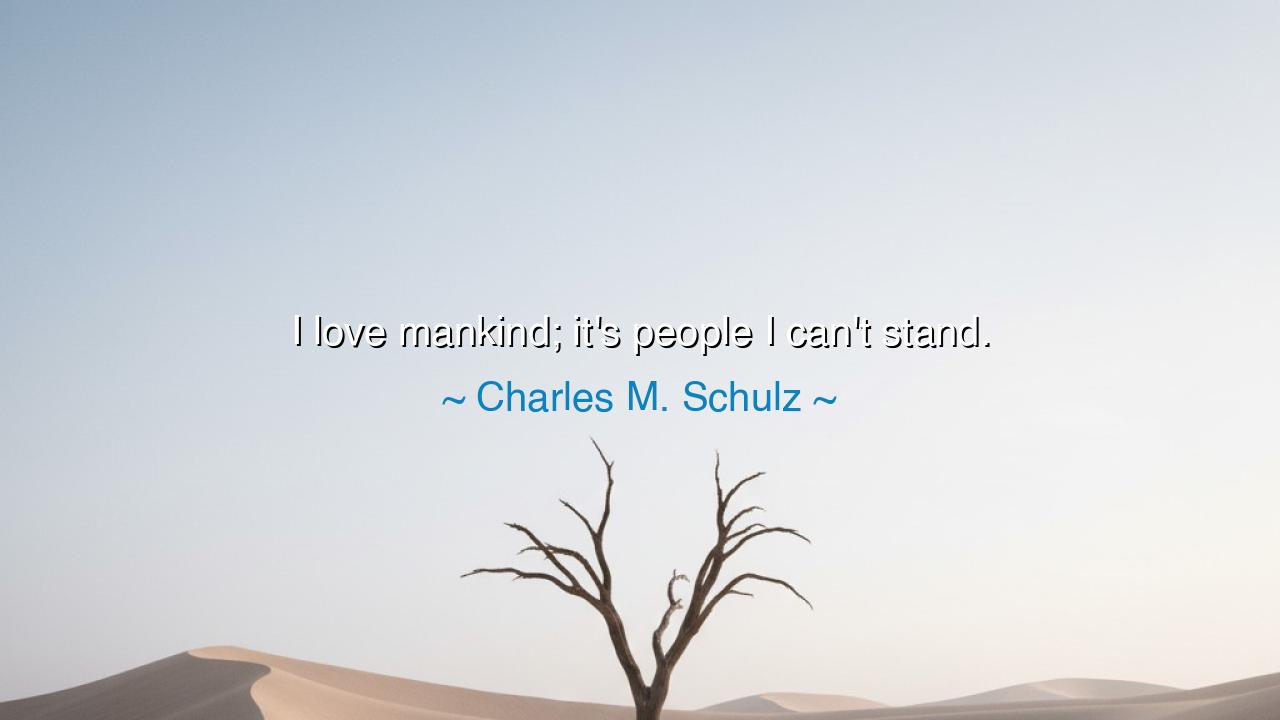
I love mankind; it's people I can't stand.






“I love mankind; it’s people I can’t stand.” Thus spoke Charles M. Schulz, the quiet philosopher who gave the world Peanuts, whose gentle humor masked a deep understanding of the human heart. In this simple, paradoxical line — spoken through the voice of his beloved character Linus van Pelt — Schulz unveils one of the great contradictions of human nature: that we are quick to love humanity in the abstract, yet slow to forgive the flaws of individuals. His words, though clothed in jest, carry the sorrow of one who has seen the gap between the ideal and the real, between the dream of compassion and the difficulty of daily grace.
In the ancient days, philosophers and poets spoke often of this same paradox. The Stoics taught that to love mankind was the highest virtue, yet they also warned that the company of men was often a trial. The prophets called us to brotherhood, even as they wept over the stubbornness of the human heart. Schulz’s humor, then, stands in a long lineage of wisdom that sees through sentimentality. To love mankind is to love an idea — noble, pure, and distant. To love people, however, is to love what is near: the irritating, the imperfect, the selfish, and the fragile. It is far easier to embrace humanity as a dream than to endure it as a reality.
Schulz himself was a man of introspection, often wrestling with loneliness despite his fame. Through the simple lines of his comic strip, he explored the vastness of human emotion — hope, fear, rejection, love — all through the innocence of childhood. When he wrote, “I love mankind; it’s people I can’t stand,” he was not condemning others, but revealing his own struggle — the struggle of a soul who yearns for goodness but is pained by the pettiness and cruelty of daily life. Like many artists before him, he saw that it is easier to love from afar than to live with compassion up close.
History, too, bears witness to this truth. Consider the story of Leo Tolstoy, the great Russian writer who preached love and brotherhood to all mankind, yet could not find peace with his own family. His heart burned for humanity, but in his home he quarreled and despaired. Such is the human tragedy — that our love for the world can falter when faced with the noise, the misunderstanding, the small wounds of everyday existence. To love the world as a concept requires imagination; to love a single person requires patience, humility, and endurance.
And yet, Schulz’s irony is not despair — it is a mirror held to our hypocrisy. For within his jest lies the call to grow. If we truly wish to love mankind, we must begin not with the idea, but with the person beside us: the friend who disappoints, the stranger who annoys, the relative who misunderstands. Great love begins in small forgiveness. The one who can bear with people, in their frailty and noise, will discover a deeper and more lasting affection than the one who loves only from a distance.
There is a quiet heroism in such love. The teacher who listens to the unruly child, the nurse who tends to the ungrateful patient, the parent who forgives the stubborn child again and again — these are the true lovers of mankind. Their love is not made of words or ideals, but of daily acts of mercy. Schulz reminds us that the test of love is not found in speeches or dreams, but in the patience we show when people fail to be lovable.
So let us learn from this ancient jest wrapped in modern ink: to love humanity is easy; to love humans is divine. Let us not flee into the comfort of grand ideals while neglecting the small duties of kindness. Each moment offers a chance to close the gap between our love for mankind and our weariness of people. It begins with listening instead of judging, forgiving instead of resenting, and finding humor, as Schulz did, in our shared absurdity.
Thus, O seeker of wisdom, remember this: it is easy to love the world when it is far away, but salvation lies in loving the world that stands right before you. Begin with one person. See their imperfection and choose mercy. Laugh at the folly of humanity, but never lose faith in its worth. For only when we learn to love the difficult and the near will our love for mankind become real — not a dream in the clouds, but a light in the heart.






AAdministratorAdministrator
Welcome, honored guests. Please leave a comment, we will respond soon